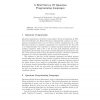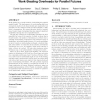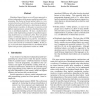1024 search results - page 48 / 205 » Complexity and Performance in Parallel Programming Languages |
143
click to vote
FLOPS
2004
Springer
15 years 7 months ago
2004
Springer
Abstract. This article is a brief and subjective survey of quantum programming language research. 1 Quantum Computation Quantum computing is a relatively young subject. It has its ...
107
Voted
IPPS
2003
IEEE
15 years 7 months ago
2003
IEEE
This paper presents a technique, called loop dissevering, to temporally partitioning any type of loop presented in programming languages. The technique can be used in the presence...
123
Voted
IPPS
2007
IEEE
15 years 8 months ago
2007
IEEE
Over the years reconfigurable computing devices such as FPGAs have evolved from gate-level glue logic to complex reprogrammable processing architectures. However, the tools used f...
SPAA
2009
ACM
16 years 2 months ago
2009
ACM
Work stealing is a popular method of scheduling fine-grained parallel tasks. The performance of work stealing has been extensively studied, both theoretically and empirically, but...
107
click to vote
HIPS
1998
IEEE
15 years 6 months ago
1998
IEEE
Distributed shared objects are a well known approach to achieve independenceof the memory model for parallel programming. The illusion of shared (global) objects is a conabstracti...



